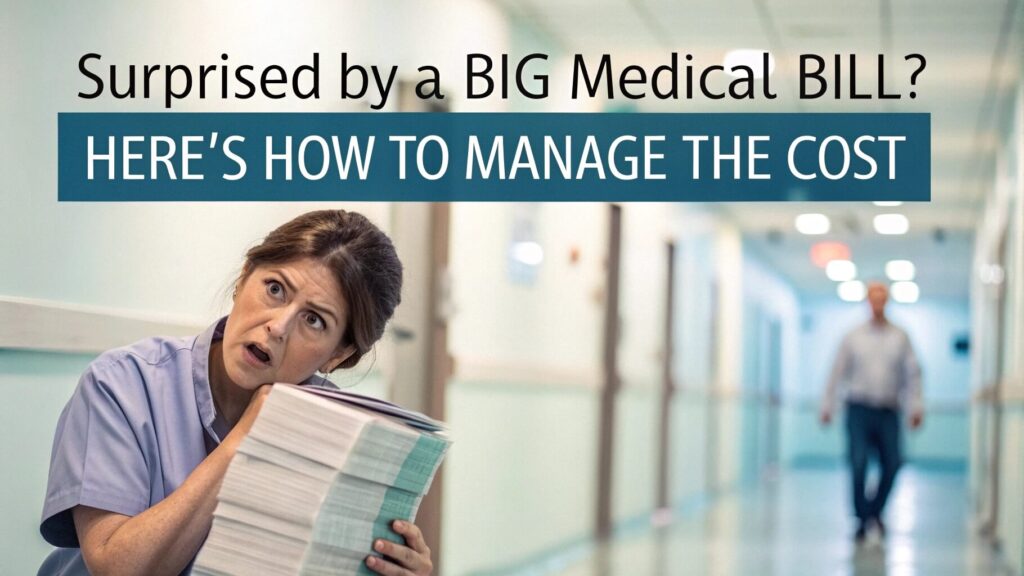Your heart skips a beat at that moment, not from a medical scare but from the sheer weight of the medical bill that just arrived in your mailbox or email. You’re most definitely not alone here in Australia if you have ever felt that sinking sensation.
Even with Medicare and private health insurance, you may be left wondering how to pay unexpected out-of-pocket costs. It could be a specialist gap payment, hospital stay expenses, or treatments not totally covered by your policy. Still, the shock can be debilitating. Still, let yourself relax! Despite the challenges, there are practical steps you can take to maintain control without jeopardising your financial stability. Let’s go through how you might aggressively address that unexpected debt.
First Steps: Know Just Exactly What You Are Paying For
Sitting down with the bill and actually reading it correctly comes first before allowing panic to strike. It sounds simple, but in a stressed-out moment, it’s easy to just see the large numbers at the bottom and get paralysed.
Study closely every item on the list.
- Are the dates of service correct?
- Do you know the name of the provider?
- Search for particular item codes, sometimes referred to as MBS (Medicare Benefits Schedule) item numbers for services possibly covered by Medicare.
Errors do happen occasionally. A basic administrative error might cause inaccurate billing. If anything seems unclear, confusing, or just plain wrong, don’t hesitate to call the billing department of the hospital, clinic, or specialist’s office. Request politely an explanation of the charges. You must fully understand the charges before deciding on your next course of action.
Review Your Coverage: Private Health Insurance and Medicare Explained

Understanding the bill itself now will help you to determine how your safety nets, Medicare, and any private health insurance you might have applied. Medicare assists in Australia in paying for several basic medical treatments. Sometimes a doctor will bulk bill, in which case you pay nothing upfront. Other times you pay the doctor’s fee; Medicare pays a rebate for some of it, leaving an out-of-pocket ‘gap.’
If you have private health insurance, it complements Medicare and often covers expenses Medicare does not, such as hospital lodging as a private patient or extras like dental and physical therapy. Private policies, however, have complexity that influences your actual return, including waiting periods, annual limits, excesses, and co-payments.
Please obtain your most recent Medicare statements (accessible through My Gov) and any correspondence from your private health fund related to the treatment. Compare these statements with your bill to determine the precise payments made and the actual remaining balance. These details will help you to clearly understand your real responsibility.
Examining Your Payment Choices and Support
Equipped with a clear knowledge of the bill and your coverage, it is now time to consider how best to pay the outstanding debt. Assume the figure on the bill is flexible and negotiable, payable straightforwardly in one lump sum.
Many healthcare providers, particularly larger clinics and hospitals, are eager to talk about payment policies. Tell their billing or finance department your truthfully based situation.
- Find out whether they have installment plans to divide the expense over several months. Many times interest-free, these plans can help you greatly control a big bill within your current budget.
- Certain providers might also have financial hardship programmes for consumers actually having difficulty paying. Inquiring about these choices is always worthwhile.
- Australians may want to apply for early release of superannuation on compassionate grounds to cover medical costs in extremely specific and serious circumstances, but be advised that this has strict eligibility criteria set by the Australian Taxation Office (ATO) and possible long-term effects on your retirement savings, so it requires careful thought.
Documentation for Possible Tax Relief
Managing big medical expenses is about knowing any possible financial relief down the road, especially at tax time, not only about finding the money now. Maintaining exact records of all your medical bills, payment receipts, Medicare, and your private health insurer statements is absolutely vital.
Although most Australians have had their general Net Medical Expenses Tax Offset phased out, some particular expenses may still provide some relief. Keep thorough records for all out-of-pocket medical expenses since eligibility for particular claims might vary and proof is absolutely necessary. For instance, expenses for aged care, disability aids, or attendant care could possibly fit the tax deduction rules for medical expenses. Maintaining orderly records guarantees that, should you be qualified for any such deductions, you have the required information, so it helps you reduce your tax load wherever possible.
When Should One Obtain Expert Financial Advice?
Navigating a medical bill alone can be intimidating, whether it is large or if it is straying from an already limited budget and causing strain. Here is where professional guidance can really change things.
A qualified accountant or financial advisor can help you evaluate your whole financial situation, design a reasonable budget including the medical debt, and investigate ways to control it in line with your other financial objectives. During a trying period, their objective guidance catered to your particular situation can be quite comforting.
For example, residents who have a large medical debt in addition to other financial obligations may find customised advice from local experts, such as accounting firm Bargo, quite helpful for negotiating their particular circumstances and maybe reorganising their finances to cover these unanticipated expenses without compromising their long-term financial situation. Expert advice can bring clarity and a strong forward plan.
Making Ahead Plans to Diminish Future Bill Shock Risk
Although you cannot always forecast when you will require medical attention, you can help to reduce the likelihood of future shockingly high bills.
- Ask actively about the anticipated expenses before visiting a new specialist or having non-emergency surgery.
- Find out their fees, whether they belong to your private health insurer’s gap coverage program—which might help lower or completely offset in-hospital medical expenses—and what MBS item numbers they most likely use.
- Review your personal health insurance policy often to be sure it still fits your needs and that you are aware of its restrictions, excesses, and waiting times.
- Another important buffer is building an emergency fund, especially for unanticipated expenses, including medical ones, which helps to lower stress when unanticipated bills develop.
Restoring Medical Cost Control

Unquestionably upsetting, receiving a sizable, unanticipated medical bill is not a financial disaster. You can effectively negotiate these obstacles by knowing the bill, reviewing your coverage, investigating payment choices, maintaining good records, consulting professionals when needed, and proactively planning.
Never hesitate to ask for help; remember to be honest with providers and insurance companies. Following these guidelines helps you to control expenses and concentrate on what’s really important: your health and well-being.
Has a medical bill ever surprised you? Which approaches helped you control the expenses? Share your knowledge or experiences in the comments below; your ideas might guide someone else negotiating a like circumstance!
